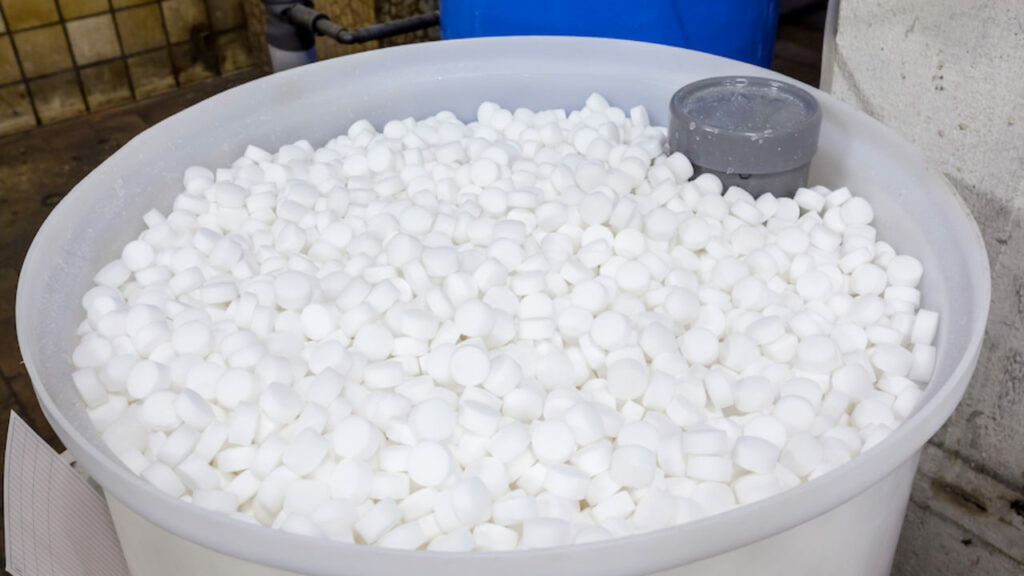How Often to Add Salt to Water Softener?
How often do I add salt to my water softener? This question is asked by many people having water softeners at home. Well, there is a need to add salt to the water softener to reduce the hardness of water. Mineral concentration like calcium and magnesium ions in water destroys pipes, fixtures, and appliances at home. It leaves stains on the dishwashers and laundry machines, which can be very annoying.
The damage can be very severe, leading to the appliance’s replacement, which can be expensive. People came up with ways to remove the hardness from the water and make it useful. Water softener was then invented and has dramatically helped in specific areas and they have a lot of benefits. Salt is an essential component of the water-softening process, so it’s necessary to know when to add more salt to the system. This article answers the “How often do I add salt to my water softener” question.
How Water Softener Works?
Water softener gets rid of hardness ions that are concentrated in water. Mostly it removes calcium and magnesium ions that harden the water. Ion exchange occurs, which attracts the positively charged ions, getting rid of them from the water. Hence, the amount of salt in the water softener determines the level of hardness in the water. Removal of the water ions makes the water pure, and the appliances are safe. However, there’s still a question if it’s safe to drink softened water.
How Often Do You Need to Add Salt to the Water Softener?
In general, it is recommended to add salt to the water softener on a regular basis, usually, every 4 to 6 weeks, to ensure the efficient operation of the unit. However, The frequency of salt added to a water softener depends on various factors, including the water hardness level, the size of the unit, and the amount of water used in a household.
It’s also worth noting that if you live in an area with hard water, or if you use a lot of water, you may need to add salt more frequently than every 4 to 6 weeks. On the other hand, if you have a small household or a smaller water softener unit, you may need to add salt less frequently.
In summary, check the salt level in your water softener regularly, and add salt as needed to ensure that your water softener operates efficiently.
How Do You Know If a Water Softener Is Running Out of Salt?
There are several ways to tell if a water softener is running out of salt:
- Decreased water softening: The primary function of a water softener is to remove hard minerals from your water supply. If your water softener is running out of salt, it will become less effective at softening water, and you may notice more hard water stains on your fixtures.
- Salt bridge: Sometimes, a hard crust forms on top of the salt in the brine tank. This can prevent water from reaching the salt, resulting in a reduction in the water-softening process.
- Salt mushing: When salt is added to the brine tank, it dissolves in the water and creates a concentrated brine solution. If too much salt is added or the salt remains in the tank for an extended period, it can form a thick, slushy layer of salt at the bottom of the tank.
- The low salt level in the brine tank: If you visually inspect the brine tank and see that the salt level is low or if the low salt alarm on your water softener is triggered, it’s a sign that your water softener is running low on salt.
- Check the salt level: Some water softeners have a visual indicator that shows the salt level in the brine tank. Check this indicator regularly to ensure that you have an adequate amount of salt. If you notice the salt level is low, it’s time to add more salt to the brine tank.
How to Check How Much Salt Water Softener Has?
To check how much salt your water softener has, you will need to access the brine tank. Here are the steps to follow:
- Locate the brine tank: The brine tank is usually located near the water softener unit. It is typically a tall cylindrical or rectangular tank.
- Remove the cover: Most brine tanks have a removable lid or cover. Lift the cover to access the tank.
- Check the salt level: Look inside the brine tank to check the salt level. Some water softeners have a visual indicator or a clear tube that allows you to see the salt level easily. If your water softener does not have a visual indicator, you will need to use a flashlight to check the salt level.
- Add salt if necessary: If the salt level is low, it’s time to add more salt to the brine tank. Check the manufacturer’s instructions for the recommended amount of salt to add. Be careful not to overfill the brine tank.
- Replace the cover: Once you have added salt to the brine tank, replace the cover securely.
Note: It is recommended to check the salt level in your water softener regularly to ensure that it has an adequate amount of salt for efficient operation.
How to Add Salt to the Softener?
- Purchase the correct type of salt: Check the manufacturer’s instructions to determine the type of salt recommended for your specific water softener. Most water softeners use either sodium chloride or potassium chloride pellets.
- Locate the brine tank: The brine tank is usually located near the water softener unit. It is typically a tall cylindrical or rectangular tank.
- Turn off the water supply: Turn off the water supply to the water softener to prevent water from flowing into the unit while you add salt.
- Remove the cover: Most brine tanks have a removable lid or cover. Lift the cover to access the tank.
- Check the salt level: Check the salt level in the brine tank to determine how much salt needs to be added. If the salt level is low, add salt to the tank.
- Add salt to the brine tank: Pour the salt into the brine tank slowly and carefully, being careful not to overfill the tank. Use a funnel to help prevent spills.
- Turn on the water supply: After you have added salt to the brine tank, turn on the water supply to the water softener.
- Check the salt level again: Wait several hours for the salt to dissolve and mix it with the water in the brine tank. Check the salt level again to ensure that it is at the appropriate level.
- Replace the cover: Once you have confirmed that the salt level is adequate, replace the cover securely.
Note: It is recommended to add salt to the brine tank regularly, as specified in the manufacturer’s instructions, to ensure that the water softener operates efficiently.
Does Water Softener Salt Expire?
Water softener salt does not typically expire, but it can absorb moisture over time, which can affect its effectiveness. When the salt pellets or blocks absorb moisture, they can harden and form a solid mass, making it difficult for them to dissolve in the water and regenerate the resin beads in the water softener unit.
Conclusion
Water hardness is experienced in several areas of the world. The water damages appliances and makes it daunting to do laundry and dishes. Water softener cleanses the ions that cause hardness in the water. To know if the water softener is insufficient, you need to check the water level because salt should be above the water level. A little salt in the softener means some hardness in the water will be experienced. Adding salt to water involves filling the tank twice a month to avoid the effects of water hardness.




